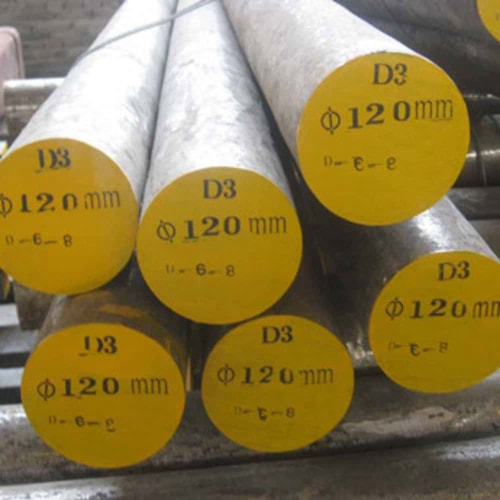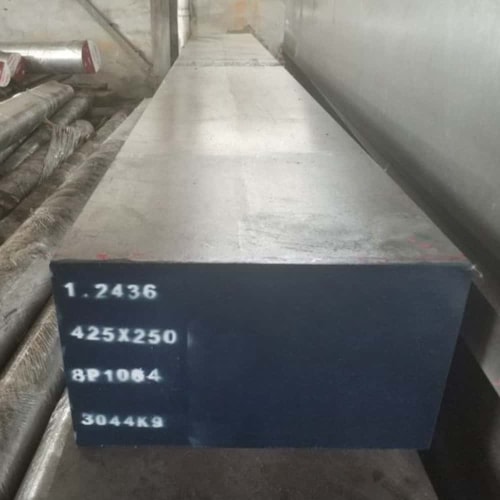D3/1.2080 Cold Work Tool Steel

D3/1.2080 Cold Work Tool Steel
D3 (also known as 1.2080) is a high-carbon, high-chromium cold work tool steel known for its excellent wear resistance and hardness, making it ideal for tools exposed to high abrasive wear. It offers a good balance between hardness and toughness, ensuring extended tool life, even under demanding conditions.
D3/1.2080 tool steel is a versatile material known for its durability and high performance in cold work tooling applications. Its combination of high hardness, wear resistance, and toughness makes it a popular choice in industries ranging from automotive manufacturing to plastics and metalworking.
Product Parameter Table
Chemical composition :
|
Element |
D3 |
1.2080 |
|
C |
2.0-2.35 |
1.9-2.2 |
|
Si |
0.1-0.6 |
0.2-0.6 |
|
Mn |
0.03max | |
|
S |
0.03max | |
|
P |
0.1-0.6 |
0.1-0.6 |
|
Cr |
11.0-13.5 |
11.0-13.0 |
|
V |
1.10max | |
|
T |
1.0max |
Mechanical properties :
|
Tensile Strength Mpa |
Yield Strength Mpa |
Elongation % |
Reduction Area Z(%) |
Charpy Impact |
|
600-1000 MPa |
≥400 MPa |
≥8% |
/ |
24 J |
Round steel:
Rolling size range: 10-260mm
Forging size range: 70-800mm
Square steel:
Thickness size range: 10-500mm, width size range: 200-810mm
Forged rings:
Outer diameter size can reach up to 1000mm
Application
1. Cutting Tools
Blades and Knives: D3 steel is widely used for manufacturing cutting tools such as industrial blades, knives, and shear blades. Its excellent wear resistance and edge retention make it ideal for cutting through abrasive materials and in high-stress cutting applications.
Punches and Dies: D3 steel is a common choice for punches and dies used in blanking, punching, and cutting operations, where high strength and resistance to deformation are required.
2. Molds and Dies
Injection Molds: D3 steel is used in the production of injection molds, particularly for molding plastics and other materials that undergo high-pressure conditions. Its resistance to wear and ability to maintain its shape under pressure make it ideal for high-precision molds.
Die Casting Dies: Due to its toughness and high wear resistance, D3 steel is often chosen for die casting applications, where the mold must endure high temperatures and pressures.
3. Stamping Dies
Forming Dies: D3 steel is commonly used in stamping dies for automotive, aerospace, and general manufacturing industries. Its resistance to wear and toughness make it well-suited for high-volume production runs involving stamping and forming operations.
4. Cold Work Tools
Extrusion Dies: D3 steel is used in extrusion dies, where it must withstand the pressures and abrasions associated with shaping materials such as metals, plastics, and rubber.
Bending and Drawing Dies: D3 steel’s strength and resistance to wear and deformation make it a popular choice for bending and drawing dies used in metalworking and forming operations.
5. Plastic Mold Tools
Compression Molds: D3 steel is also used in compression molding tools where high strength, wear resistance, and the ability to maintain dimensional stability are required, particularly in high-volume plastic molding.
6. Woodworking Tools
Planer Blades and Router Bits: D3 steel is used for manufacturing woodworking tools such as planer blades, router bits, and saw blades, where its edge retention and toughness are highly valued for processing tough woods and other materials.
7. Aerospace and Automotive Components
Precision Dies and Parts: D3 steel is employed in the production of high-precision dies and components used in the aerospace and automotive industries. The steel’s ability to maintain shape and resist wear under demanding conditions is critical in these applications.
8. Food Processing Tools
Food Cutting Knives: In the food industry, D3 is used to make knives for cutting, slicing, and dicing tough food materials, where wear resistance and edge retention are important for maintaining tool performance over time.
9. Tooling for Cold Working
Tooling for Metal Forming: D3 steel is used for tooling in metal forming operations such as deep drawing, piercing, and blanking, where high abrasion resistance and toughness are required for high-volume production.
Customer Testimonials
High Wear Resistance
D3/1.2080 steel’s high wear resistance is a standout feature. The high chromium content forms hard carbides within the steel matrix, making it highly resistant to wear from sliding contact with other metals. This has been a game-changer for our cutting tools and dies, as they maintain their sharpness and precision over long periods of use, reducing the need for frequent replacements and maintenance.
Excellent Hardenability and Dimensional Stability
The hardenability of D3/1.2080 steel is remarkable. It can be heat-treated to achieve a hardness of 58-64 HRC, which is crucial for our high-precision tools and molds. Moreover, the dimensional stability after heat treatment is excellent, ensuring that our products maintain their shape and size even under varying operating conditions. This reduces the need for adjustments and rework, saving us time and resources.
Good Toughness and Impact Resistance
Despite its high hardness, D3/1.2080 steel exhibits good toughness and impact resistance. This is particularly important for our tools that are subjected to high impact forces during operation. The steel’s ability to withstand such forces without cracking or deforming has significantly improved the reliability and durability of our products, making them suitable for demanding applications.





